Cainteoirí
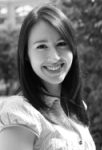
|
Byrne, Maria | Suirbhéireacht Ordanáis Éireann Maria.Byrne@osi.ie Maria Byrne is a GIS & Business Consultant working for Ordnance Survey Ireland (OSi), the national mapping agency of Ireland. She graduated from NUI Maynooth with a BA in Geography and Music, and MSc in GIS (Geographical Information Systems) and Remote Sensing. While working in OSi, she subsequently completed a part-time postgraduate diploma in IT in DCU. Maria is a GIS professional specialising in web mapping technologies, and currently works in the IT department of OSi managing and developing OSi’s web mapping service MapGenie, which provides online immediate access to OSi’s mapping database. She also sits on the executive committee of IRLOGI, the Irish Organisation for Geographic Information. IRLOGI is the primary forum for the GIS industry in Ireland, and Maria currently holds the position of Treasurer. |
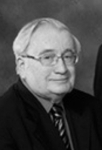
|
Côté, Jean-René | Commission de toponymie du Québec jeanrenecote@gmail.com Jean-René Côté has been a commissioner of the Commission de toponymie du Québec since 1994. He is a Doctor of Natural Sciences of the Université de Montpellier, France. Before his retirement he held positions as Vice-President, Bureau d’audiences publiques en environnement Province of Québec, Director of the Research division at the Québec Society for the Treatment of Used Waters, Chairman and professor at the department of Biological Sciences Université du Québec in Montréal. He was also a member of the Comité de toponymie of the City of Boucherville, Québec and a member of the Board of directors of the Société de généalogie canadienne-française. He is the author of many historical and international scientific publications. |
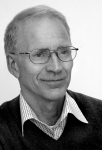
|
Helleland, Prof. Botolv | Institute of Linguistics and Scandinavian Studies, University of Oslo botolv.helleland@iln.uio.no Botolv Helleland was born in 1940. He was an Assistant Professor in onomastics, Institute of Linguistics and Scandinavian Studies, University of Oslo from 1972 to 2010 where he was a lecturer and supervisor in onomastics. He has given courses in collecting, storing and digitizing microtopnyms. He has published a number of works on names, especially place-names, e.g. Adresser og stadnamn 1993 [Addresses and Place-names], Stedsnavn i Kjose 2008 [Place-names in Kjose] and has organized twelve national conferences on names. He has been the editor of the journal Nytt om namn [News about Names] since 1984. He was President of the Nordic Cooperation Committee on Name Research (NORNA) from 1985 to 1989 and President of the Norwegian Names Association from 1989 to 1996. He was a member of the Board of ICOS (International Council of Onomastic Sciences) from 1993 to 1999. He has been a state place-name consultant since 1984. He has been the Norwegian member/delegate to the United Nations Conferences on the Standardization of Geographical Names and UNGEGN since 1987 and a member of the UNGEGN Working Group on Evaluation and Implementation since 2000. |
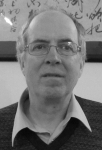
|
Jones, Gwyn | Bwrdd Yr Iaith Gymraeg gwyn.jones@byig-wlb.org.uk Gwyn Jones spent his formative years in Caernarfon in north-west Wales, which, at that time (as indeed at present) had the highest percentage of Welsh speakers of any town in Wales. He is a native Welsh speaker, and received his secondary education in the local grammar school. He was educated further at the University of Nottingham, SOAS, and, latterly, at the Open University. He holds first degrees in Mathematics and Statistics, as well as in Linguistics and the Classics, and is about to undertake postgraduate study in Buddhist Studies. After 18 years spent as a career civil servant, working in various public policy areas at the Welsh Office in Cardiff, he transferred to the advisory Welsh Language Board in 1991. When the statutory Board was formed in December 1993, as a result of the Welsh Language Act 1993, he transferred formally to that organisation, and has been based there ever since. Until recently, he was Director of Policy and Terminology at the Board. He is currently Director of Change, charged with ensuring a smooth transition, as the Board is disbanded and the Office of the Welsh Language Commissioner for Welsh is established. His abiding interest at the Board is onomastics, and he is a member of the Board’s Standardisation of Place-names Committee since 2001. He recently presented two papers on the standardisation of place-names in Wales: in March 2010 to the SNSBI in Carmarthen, and in June 2010 to the ‘Trends in Toponomy’ conference at the University of Edinburgh. |
|
Kaptein, André | Department of Address Data, Estonian Land Board |
|
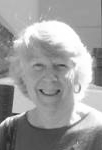
|
Kerfoot, Helen | Cathaoirleach, United Nations Group of Experts on Geographical Names (UNGEGN) Helen.Kerfoot@NRCan-RNCan.gc.ca Helen Kerfoot is the elected Chair of the United Nations Group of Experts on Geographical Names (UNGEGN), 2002-2012 and is an Emeritus Scientist at Natural Resources Canada. Trained as a geographer at the University of London, England, Ms. Kerfoot had a career as a school teacher and a research geomorphologist in Arctic Canada, before joining the mapping program at Natural Resources Canada. From 1987 to 1998 she headed the Secretariat for Canada’s national geographical names authority, and as a manager was responsible for the national toponymic database being made available on the Internet, a geographical names website being developed and various publications on Canadian toponymy being completed. As UNGEGN Chair, Ms. Kerfoot has promoted the significance of the geographical names standardization, both for spatial data infrastructures and for preservation of cultural heritage. She has led the creation of the UNGEGN website, publication of manuals and brochures, development of a world names database, and has encouraged UN support for UNGEGN training courses and a special UNGEGN emphasis on efforts in Africa. Ms. Kerfoot has been a Governor of the Royal Canadian Geographical Society, President of the Canadian Society for the Study of Names and Chair of the Ontario Geographic Names Board, and is the author of a variety of toponymic articles. |
|
King, Dr. Jacob | Ainmean-Àite na h-Alba jking@ainmean-aite.org Dr. Jacob King works for Ainmean Àite na h-Alba; this is a national advisory partnership to research and establish the correct and appropriate Gaelic forms of place-names for maps, signage and general use. His current role is to undertake the academic research to fulfil these aims; he is also partially responsible for developing and maintaining the online database. In 2008 he completed a PhD entitled Analytical Tools for Toponymy: Their Application to Scottish Hydronymy. This used computational methods to discover underlying patterns in toponymy, focussing on Scottish river-names. He is a committee member of the Scottish Place-name Society and on the panel of reviewers for the Journal of Scottish Name Studies as well as the author of a number of articles. As part of his work, he recently collaborated on ‘Gaelic in the Landscape: Place-names in Islay and Jura’ which was compiled using information gathered form local informants, published by Scottish Natural Heritage. |
|
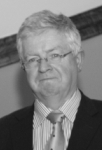
|
Mac Giolla Easpaig, Dónall | An Brainse Logainmneacha Donall.MacGiollaEaspaig@ahg.gov.ie Dónall Mac Giolla Easpaig was born in Inishowen, County Donegal, in 1948. He was educated at St. Columb’s College, Derry, and University College, Dublin, from where he graduated with a BA degree in Celtic Studies and MA in Early and Medieval Irish. He has worked in the Placenames Branch since 1972, formerly of the Ordnance Survey of Ireland, and now of the Department of Arts, Heritage and the Gaeltacht. He has been Chief Placenames Officer and Secretary of An Coimisiún Logainmneacha (The Placenames Commission) since 1998. He has been the Irish delegate to the United Nations Conferences on Geographical Names and member of the Celtic Division of the United Nations Group of Experts on Geographical Names (UNGEGN) since 1998, where he was co-Rapporteur of UNGEGN from 2002–2007, and Convenor of its Working Group of Pronunciation from 2002–2012. He is the current president of the Society for Name Studies in Britain and Ireland (SNSBI). He has published extensively on Irish placenames. |
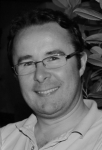
|
McNally, Dermot | Open Street Maps dermotm@gmail.com Dermot McNally is an Internet industry veteran and a lover of maps. With a background in programming and system administration, his career focus has been the creation of interactive web applications. He is co-founder and former CTO of the online tour operator Directski.com. Since 2007 he has been an active contributor to the open-data OpenStreetMap project (OSM), often referred to as the “Wikipedia of maps”. Since late 2011 he has been a board member of the OpenStreetMap Foundation (OSMF), a UK-based non-profit organisation created to support the project. Part of his work on OSM has involved finding suitable ways to capture the more challenging aspects of Irish places and their names. www.openstreetmap.org/ | www.osmfoundation.org/wiki/Main_Page/ | www.directski.com/ |
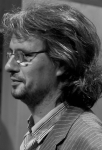
|
Mêchura, Michal Boleslav | Fiontar, Ollscoil Chathair Bhaile Átha Cliath mechrm@dcu.ie Michal Boleslav Mĕchura is a language technologist and information architect based in Dublin, Ireland. He works for Fiontar, Dublin City University on projects such as the Placenames Database of Ireland (logainm.ie) and the Irish National Terminology Database (focal.ie). He had previously worked for Microsoft Ireland as a software localization engineer. |
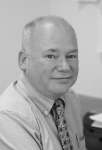
|
Morgan, Peadar | Bòrd na Gàidhlig email: peadar@gaidhlig.org.uk Peadar Morgan is currently Research and Corpus Planning Manager for Bòrd na Gàidhlig, after joining as Language Planning Manager. The Bòrd was formally established by legislation in 2005 to increase the knowledge and use of Scots Gaelic, and increase access to the language and its culture. He joined the Bòrd staff from being director of Clì Gàidhlig, a body working for those such as himself and his wife who came to the language from a non-Gaelic upbringing. In a reversal of language shift, however, their family of three in the Black Isle, north of Inverness, are being raised and schooled as native speakers. Peadar has submitted a part-time PhD thesis on ethnonyms in the place-names of Scotland and the English border counties, and was for several years on the committee of the Scottish Place-Name Society. He has been involved in the multi-agency partnership Ainmean-Àite na h-Alba (AÀA) and its predecessor body since the start of coordinated Gaelic toponymic planning in 2000. Commencing with clarification of orthographic issues on OS maps, at Peadar's instigation this role moved into one of building a fully-researched online national gazetteer and advice-service for the growing area of dual-language signing and naming. AÀA employs fulltime a researcher and a coordinator, with Peadar representing the Bòrd and acting as peer reviewer. AÀA is expected to be a constituent part of the forthcoming Gaelic language academy, in the development of which Peadar is involved through Bòrd na Gàidhlig. |
| Murphy, Tony | Suirbhéireacht Ordanáis Éireann | |
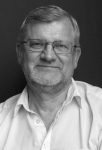
|
Nilsson, Leif | Swedish Institute for Language and Folkfore leif.nilsson@sofi.se Leif Nilsson was born in 1948. He studied studied English, Irish, linguistics, phonetics and Swedish with a specialization in onomastics at Uppsala University, receiving a BA in 1973. He was head of the name section at the National Land Survey from 1990 to 1995. He has been a place-name consultant at the Swedish Institute for Language and Folklore in Uppsala since 1996. He is a member of the Swedish Place-Name Advisory Board, a member of the UNGEGN Norden Division and of the UNGEGN Working Group on Pronunciation. His main field of research is the standardization of Swedish place-names. He is also currently engaged in a project on nicknames of Swedish sports idols. |
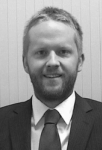
|
Ó Raghallaigh, Dr. Brian | Fiontar, Ollscoil Chathair Bhaile Átha Cliath brian.oraghallaigh@dcu.ie Dr Brian Ó Raghallaigh is a lecturer in Fiontar, Dublin City University and is currently involved in the technical management and development of the ainm.ie, focal.ie and logainm.ie projects. He previously worked on the Irish synthesis project abair.ie at Trinity College Dublin. He has a background in computer science, linguistics and Irish, and completed his Ph.D. thesis on multidialect phonetisation for Irish, also at Trinity College Dublin. |
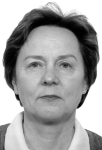
|
Paikkala (MA,PhD), Dr. Sirkka | Research Institute for the Languages of Finland sirkka.paikkala@kotus.fi Dr. Sirkka Paikka has an MA and a PhD from the University of Helsinki. She has been the Senior Researcher (Head of Name Planning and Guidance) at the Research Institute for the Languages of Finland since 1996 and an adjunct Professor in onomastics at the University of Helsinki and the University of Turku since 2005. Her main areas of research are Finnish place-names and personal names. She was a Name Researcher and Name Planner (street names) in the City of Espoo, Town Planning Department from 1980 to 1995 and was involved in the collecting of Finnish place-names from 1976 to 1996. She has been a member of the United Nations Group of Experts of Geographical names since 1996 and was Chair of the Norden Division in UNGEGN from 2002 to 2007. She has also been a member of the (Personal) Name Board in the Ministry of Justice since 2000 and a member of the working group on Scandinavian anthroponymic terminology (NORNA) since 2001. She was a member of the Name Board in the City of Helsinki from 1996 to 2004 (street names). She was the chief editor and one of the authors of the Suomalainen paikannimikirja [Finnish Place-Name Lexicon] which was published in 2007. She was also one of the authors of Sukunimet [Finnish Surnames; with Pirjo Mikkonen] published in 1984 and revised in 1988 and in 1998. She is also the author of Se tavallinen Virtanen. Suomalaisen sukunimikäytännön modernisoituminen 1850-1920 (2004) [The ordinary Virtanen. The modernization of the Finnish surname practices from the 1850s to 1921]. She is currently editing a book of Finnish exonyms. |
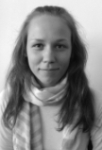
|
Palu, Annika | Department of Address Data, Estonian Land Board Annika.Palu@maaamet.ee Annika Palu was born in 1987. She has a BA in Landscape Architecture (2006–2009) and is studying for an MA in Urban Governance (2009–). She has been a Chief Specialist in the Department of Address Data , Estonian Land Board since November, 2010. She is currently taking part in the compilation of a handbook of address data in Estonia. The handbook is intended for anyone who is interested in addresses and in place names in Estonia and for local authorities who are in charge of creating addresses and keeping them in order. (It is available at http://ads.maaamet.ee/ - only in Estonian at the moment). |
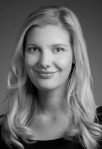
|
Sholts, Crystal | Google Maps
crystals@google.com Crystal Sholts is a Geopolitical Program Manager in Engineering at Google. Since 2005, she has advised product teams. Her primary work involves Google Maps, Google Earth and Map Maker. She specializes in the depiction of geopolitically and culturally complex areas: territorial and naming disputes and multilingual regions. Crystal was Google’s first observer to the United Nations Group of Experts on Geographical Names (UNGEGN) conference in 2007 and has been regularly attending conferences since. She also maintains Google’s relationships with other organizations such as the U.S. Advisory Committee on Antarctic Names (ACAN), the Polar Geospatial Center (PGC), the Scientific Committee on Antarctic Research (SCAR) and the U.S. Office of the Geographer. Prior to Google, Crystal interned at the U.S. Embassies in Moldova and Tanzania, the U.S. Senate, and the Carnegie Moscow Centre. She received an MSc from the London School of Economics in Russian and Post-Soviet Studies and received her B.A. with honors from Stanford University in International Relations. |
|
Urbanas, Saulius | EuroGeographics EuroGeographics is an international not-for-profit organisation (AISBL/ IVZW under Belgian Law. BCE registration: 833 607 112) and the membership association for the European national mapping, land registry and cadastral agencies. It brings together 56 members from 45 countries, from Portugal to the Ukraine and Iceland to Turkey. EuroGeographics’ members invest around €1.5 billion in the development of geographical information each year and use cutting-edge technology to create, manage, maintain and make available authoritative national databases. EuroGeographics’ members are developing an infrastructure to integrate their national data – including topographic and land information – to deliver the definitive pan-European location framework for a wide range of uses. By sharing best practice and creating standard data specifications and policies, EuroGeographics aims to ensure that members’ individual geographical databases are compatible and can interact with one another. This will provide Europe with the high quality geographical information it needs to develop policies and legislation for the environment, business competitiveness, public services, legal systems, security and more. To find out more about EuroGeographics, please visitwww.eurogeographics.org. To see our members’ geographical information in action, please visit our showcase at www.youtube.com/eurogeographics |

